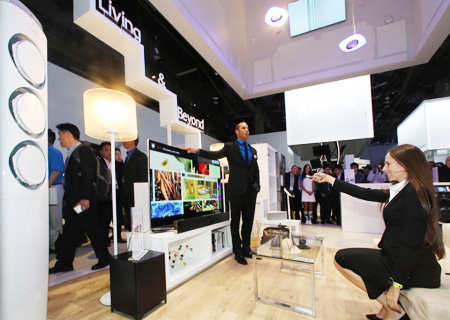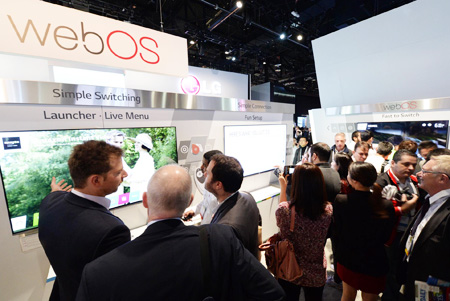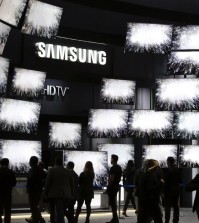- California Assembly OKs highest minimum wage in nation
- S. Korea unveils first graphic cigarette warnings
- US joins with South Korea, Japan in bid to deter North Korea
- LPGA golfer Chun In-gee finally back in action
- S. Korea won’t be top seed in final World Cup qualification round
- US men’s soccer misses 2nd straight Olympics
- US back on track in qualifying with 4-0 win over Guatemala
- High-intensity workout injuries spawn cottage industry
- CDC expands range of Zika mosquitoes into parts of Northeast
- Who knew? ‘The Walking Dead’ is helping families connect
Technology industry undergoing ‘software transition’
Connectivity is one of the main themes this year
at the International Consumer Electronics Show in Las Vegas

A Samsung Electronics official explains key functions of its new “Samsung Smart Home” program at its booth in this year’s International Consumer Electronics Show (ICES) at the Las Vegas Convention Center, Wednesday.
(Courtesy of Samsung Electronics)
By Kim Yoo-chul
LAS VEGAS ― The global technology industry is undergoing a “software transition” as consumer electronics manufacturers are pursuing a variety of innovative measures driven by growing appetite for connectivity between home and open software.
Connectivity is one of the main themes of this year’s International Consumer Electronics Show (ICES) being held in Las Vegas, which will run through Friday.
Stressing the increasing trend for adaptation of connected devices represented by smartphones and tablets, a senior executive of Qualcomm said the world is embracing a “software transition” ranging from media software to streaming-related solutions.
“Hardware is commoditizing. We are seeing the advent of smarter TVs and a better eco-system. We are getting the best of all things and people get connected and engaged. It’s fair to say the industry will see innovation powered by connectivity within home and open software,” said Qualcomm Atheros Vice President of Product Management Mark Carroll in a press conference organized by Parks Associates at the Las Vegas Convention Center (LVCC), Wednesday (KST).

Participants look at LG Electronics’ Web OS TV platform to be used in the firm’s premium smart TV at its booth in this year’s International Consumer Electronics Show (ICES) at the Las Vegas Convention Center, Wednesday.
(Courtesy of LG Electronics)
Talking about the emergence of a new breed of partnerships between car producers, chip suppliers and consumer electronics firms, Scott Rosenberg, vice president in charge of business development at Roku, said the adoption of connected devices and services will increase in the next three to five years, helping industries accelerate their move toward connectivity.
In a separate session themed “Evolution of the Smart TV” at the LVCC, a Samsung Electronics executive said the world’s top TV manufacturer is in the process of strengthening its existing platforms.
“Smart TVs are a fantastic opportunity for both manufacturers and advertisers. As industries shift toward connectivity, smart TVs are much more discovery devices for shopping,” Richard Bullwinkle, head of US Television Innovation at Samsung Electronics, said during the session organized by Parks Associates.
Bullwinkle admitted Samsung is now at a “very nascent stage” in smart TV for content; however, he stressed that it is actively addressing the issue by expanding tie-ups with major sports channels including ESPN and pushing the sale of its “evolution kits.”
“Amid the connectivity trend, more people are consuming content. More connectivity between TVs and other devices will hugely benefit consumers. Connected TVs accounted for 25 percent of our total TV portion three years ago; however, they now account for 70 percent. People want to experience different devices. This is one of the really interesting things,” said the Samsung executive.
Eric Johnson, executive vice president of multimedia sales at ESPN, a major sports channel in the United States, stressed that the world of connectivity led by smart TVs offers new chances to increase the revenue of advertisers as people are spending for personalized content to gain differentiated experiences.
As much as 46 percent of flat-panel TV owners in North America, or slightly more than 30 million U.S. households, have at least one smart TV. Now, two thirds of smart TVs are connected to the Internet, according to Park Associates’ analysis.
“Other connected TV devices as well as pay-TV providers are pursuing the same monetization opportunities. New entrants are also disrupting the market. In less than six months, Google Chromecast is in 8 percent of broadband households. Smart TVs will lead market innovation for the next three to five years,” said Barbara Kraus, director of research at the firm.
The new trend has pushed Yahoo CEO Marissa Mayer to focus on mobile technology. At the Las Vegas Hilton Theater, packed with more than 2,000 reporters, she emphatically stated that “We are amid a massive shift to mobile.”
Yahoo recently reached 400 million monthly mobile users ― 800 million total worldwide and is throwing its chips into the mobile game. By 2017, it expects 3.8 billion connected devices worldwide.
Mayer made a strong pitch for Yahoo’s commitment to news in the smartphone and tablet age.

















